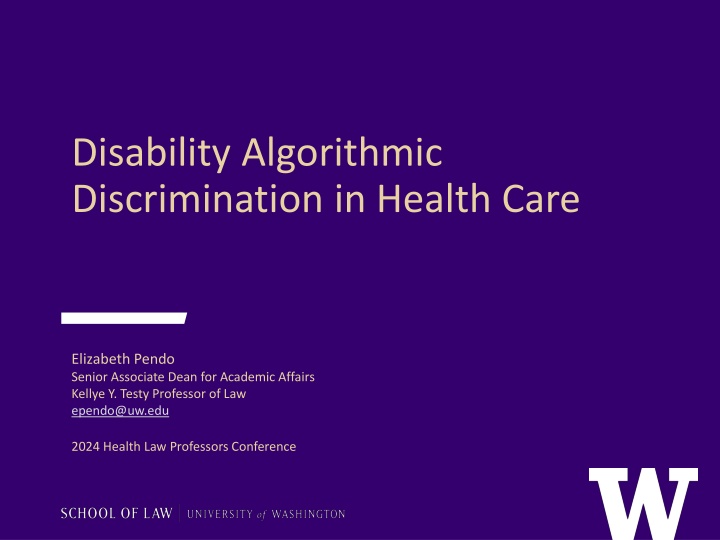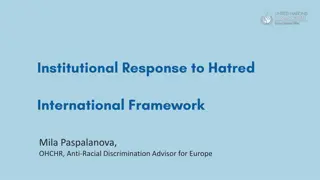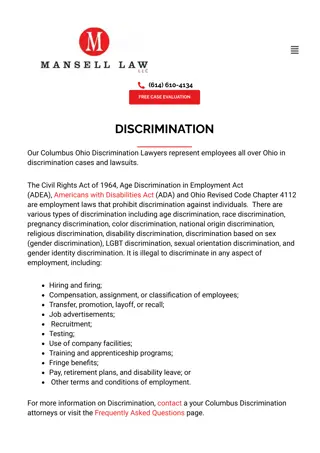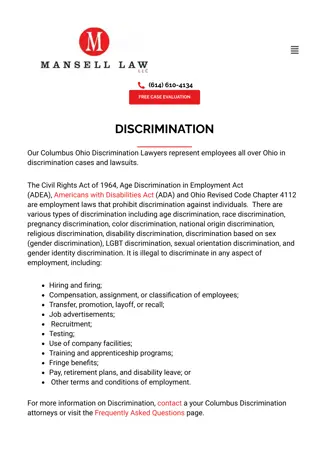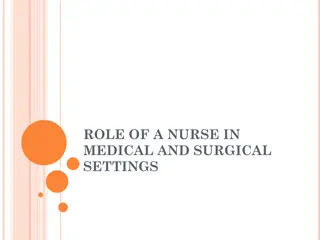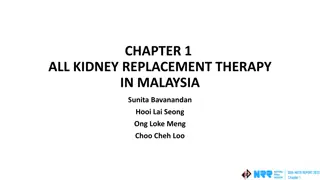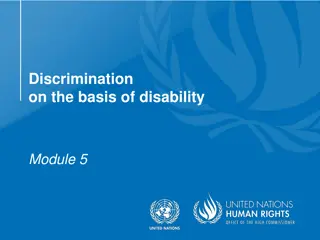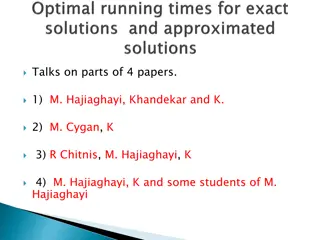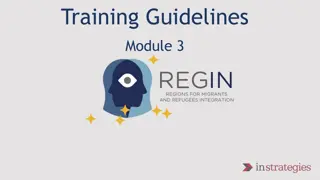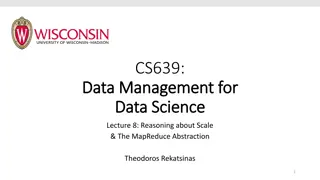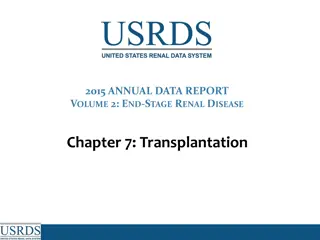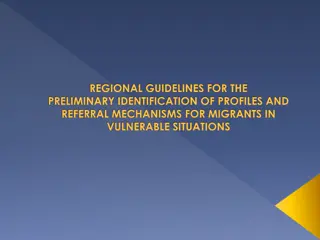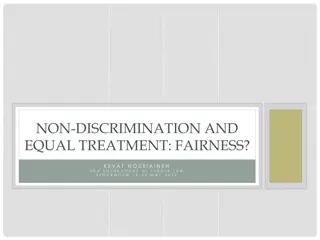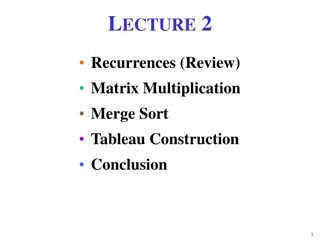Algorithmic Discrimination in Health Care: Protecting Vulnerable Patients
Elizabeth Pendo and Jennifer D. Oliva discuss disability discrimination in health care algorithms, advocating for legal protections under Section 504, ADA, and ACA. Their article proposes strategies to combat algorithmic bias and enhance antidiscrimination efforts in the 2024 Section 1557 final rule.
Download Presentation

Please find below an Image/Link to download the presentation.
The content on the website is provided AS IS for your information and personal use only. It may not be sold, licensed, or shared on other websites without obtaining consent from the author.If you encounter any issues during the download, it is possible that the publisher has removed the file from their server.
You are allowed to download the files provided on this website for personal or commercial use, subject to the condition that they are used lawfully. All files are the property of their respective owners.
The content on the website is provided AS IS for your information and personal use only. It may not be sold, licensed, or shared on other websites without obtaining consent from the author.
E N D
Presentation Transcript
Disability Algorithmic Discrimination in Health Care Elizabeth Pendo Senior Associate Dean for Academic Affairs Kellye Y. Testy Professor of Law ependo@uw.edu 2024 Health Law Professors Conference
Overview Elizabeth Pendo and Jennifer D. Oliva, Disability Discrimination by Clinical Algorithm, __ N.C. L. Rev. __ (accepted for publication) discrimination as disability discrimination. It contends that Section 504 of the Rehabilitation Act, the ADA, and Section 1557 of the ACA can be engaged to protect vulnerable patients from PDMP-related algorithmic discrimination, and provides recommendations to develop and strengthen the 2024 Section 1557 final rule concerned with clinical- decision algorithmic discrimination, harmonize new and existing antidiscrimination protections, and improve implementation and enforcement efforts. This article provides a framework for challenging PDMP algorithmic
Disability Law Framework 1973 - Section 504 of the Rehabilitation Act 1990 - Americans with Disabilities Act 2010 - Section 1557 of the Affordable Care Act (amending the Rehabilitation Act) and the Section 1557 Final Rule (May 6, 2024)
Why Disability Law? PDMPs target protected individuals The 2024 Section 1557 Final Rule covers PDMP algorithms (under the umbrella term, patient care decision support tools ) and underscores existing protections Covered health care entities rely on information from PDMP algorithms
SUD is a Disability Andrew Joseph, To Protect People with Addiction from Discrimination, the Justice Dept. Turns to a Long-Overlooked Tool: the ADA, STAT (June 22, 2022).
Final Rule Addresses Algorithms The 2022 Section 1557 proposed rule defines clinical algorithms as tools used to guide health care decision-making that range from flowcharts and clinical guidelines to complex computer algorithms, decision support interventions, and models. The 2024 Section 1557 final rule replaces the term clinical algorithm in the proposed rule with the broader term patient care decision support tool, which it defines as any automated or non-automated tool, mechanism, method, technology, or combination thereof used by a covered entity to support clinical decision-making in its health programs or activities. Nondiscrimination in Health Programs and Activities, 89 Fed. Reg. 37522 (May 6, 2024)
Disability Law and Harmful Treatment Refusal to prescribe or treat Lack of individualized assessment Unsupported safety concerns Lack of reasonable modifications
Refusals to Prescribe or Treat PDMP Algorithmic Harms Disability Rights Framework Refusal to treat or to inappropriately treat patients with actual or perceived SUD, chronic pain conditions, or other disabilities based on PDMP algorithmic information and risk scores. Title II of the ADA and Section 504 of the Rehabilitation Act prohibit individual and categorial refusals to treat due to disability.
Individualized Assessment PDMP Algorithmic Harms Disability Rights Framework Overreliance on PDMP algorithmic information and risk scores that overshadows or replaces clinical judgment. Treatment decisions must be informed by an individualized assessment of the patient based on the best available objective medical evidence. Assumption that people with high PDMP scores represent a danger to themselves or others in a clinical setting. Reliance on stereotypes and assumptions regarding risk to patients or others of treating individuals with SUD, generally. Assessment of a direct threat must rely on analysis of objective medical scientific evidence, rather than stereotypes or misconceptions, even if held in good faith.
Accommodation PDMP Algorithmic Harms Disability Rights Framework Rigid policies, practices, and procedures that do not accommodate needs of individual patients with disabilities, including SUD. Healthcare providers, systems, and institutions must make individualized, reasonable accommodations to ensure that individuals with disabilities have equal opportunities to benefit from health care programs, services, and activities, including in the use of clinical algorithms and other patient support decision making tools.
2024 ACA Section 1557 Rule Section 92.210(b) requires a covered entity to make reasonable efforts to identify patient care decision support tools used in its health programs and activities that employ input variables or factors that measure race, color, national origin, sex, age, or disability Section 92.210(c) requires that for each patient care decision support tool identified in paragraph (b), a covered entity must make reasonable efforts to mitigate the risk of discrimination resulting from the tool s use in its health programs or activities. Nondiscrimination in Health Programs and Activities, 89 Fed. Reg. 37522 (May 6, 2024)
Recommendations Three additional requirements in future rulemaking or as strong recommendations in guidance: 1. Require covered entities to ensure that clinical tools work as intended and have clinical utility and validity 2. Ensure that health care institutions develop publicly available standards for the use of clinical algorithms. 3. Require active monitoring of the equitable use and impact of tools and algorithms in health care decisions.
